The feminist community emerging from the war in Ukraine
Inside a shelter dubbed ‘FemApartment’, residents support one another as they help others affected by the Ukraine war.
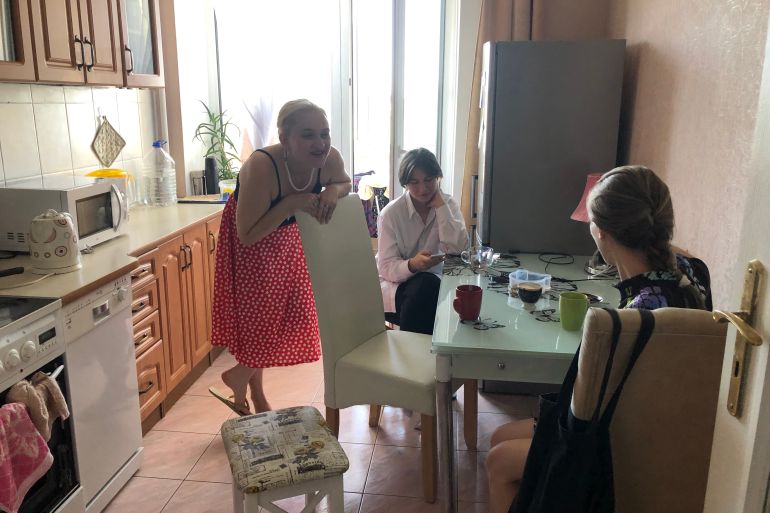
Lviv, Ukraine – Boisterous female laughter emanated intermittently from the corner unit of a drab, Soviet-style residential building. Sandals and a pink lamp sat at the entrance to the warmly-lit apartment, reached via the gloomy communal corridor.
Inside, the smell of baked fish wafted from the kitchen.
Keep reading
list of 4 itemsInside a shelter for displaced Ukrainian children
How Holocaust historians are unearthing Ukraine’s present
Ukraine’s Unstoppable Medics | Close Up
Twenty-three-year-old Mira Kapitan, a cheery copywriter and hip-hop artist originally from a suburb of Kyiv, had just popped mackerel in the oven. Also in the kitchen was her flatmate Tanya Vynska, an 18-year-old political science student with dyed orange hair.
Over the past few months, Mira, who arrived in the western Ukrainian city of Lviv with just a small suitcase, has enjoyed sharing clothes and style tips with Tanya. “We both love dresses,” she grinned, divulging how Tanya loaned her a dress for a date the other day.
The suburban Lviv apartment where Mira and Tanya live – known affectionately as “FemApartment” by its residents – was originally meant to be a temporary home to five young women. Now, however, it is a refuge for the women – strangers to one another until June last year – for as long as they need.
The women were forced to flee from different parts of Ukraine – mostly in the country’s northeast – when the full-scale invasion by Russia began in February 2022. Unable to afford to rent a room in Lviv, they found themselves homeless, but through TikTok and other social media, they learned about a shelter for women involved in different types of community activism.
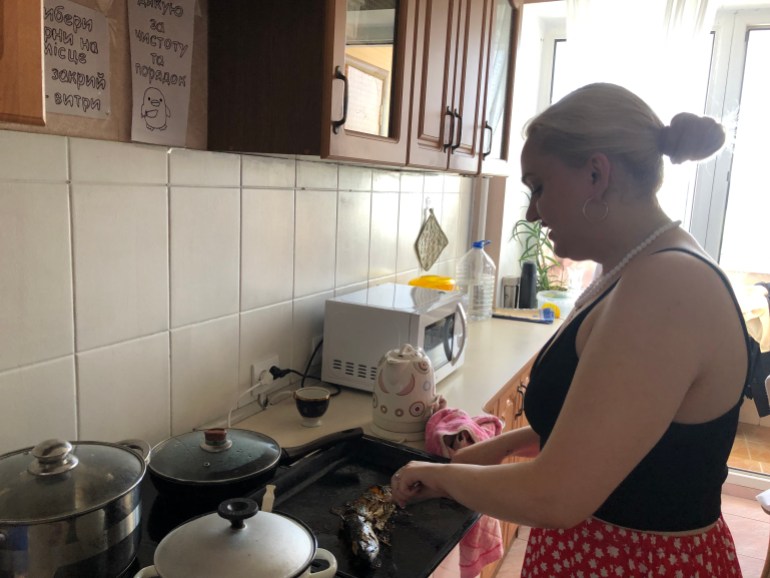
A home for activists
Katya Dovbnia is a coordinator at Feminist Workshop, a grassroots-led NGO that conducts seminars and other activities on social issues relating to women, including gender-based violence. When the war broke out, she secured temporary housing in Lviv from private owners for about 23 women and children who lost their homes in February, and accommodation for internally displaced women activists. Aside from taking care of the rent at both places, Feminist Workshop provides basic essentials like household and hygiene products and a weekly food basket. Both homes are supported through online fundraising and grants from other NGOs in Europe.
To qualify to live at FemApartment, the women had to have some experience in activism and be willing to volunteer to support others also affected by the war. These requirements, Katya says, are in line with the organisation’s ethos that feminism tackles a wide range of social injustices.
On an afternoon in late July, Tanya, wearing a pale pink T-shirt and trousers, stood by the wall while Mira checked on the fish. Katya and Veronika Yuzepchuk, an 18-year-old film student, joined them.
Expressive and outgoing, Tanya says that she and her flatmates practise “non-toxic living” by ensuring that everyone’s personal space is respected. “We all agreed that we’ll always ask permission to do things if we’re in the same room. For example, just because someone is here in the kitchen with me, doesn’t mean they feel like talking to me at the moment. I ask if they’re in the mood,” she explained.
These habits, Tanya stressed, are important in the context of shared living. She added that they “love” their duty roster, which stipulates their cleaning duties for the communal areas. Cohabiting has been surprisingly easy, the three women agreed, despite their initial apprehension about sharing a flat with unfamiliar housemates.
“We’ve never had any arguments, no serious conflicts,” Mira said with a laugh. “We treat one another well.”
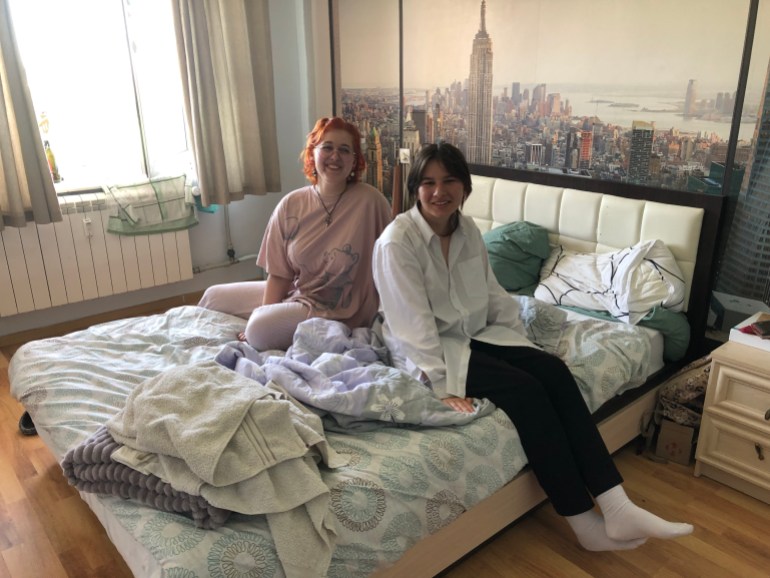
The flatmates
Despite some of the women having to share a room, the apartment feels spacious. Tanya showed me the room where she shares a double bed with Veronika who is from Kharkiv, a city in the northeast region of Ukraine that has been one of the most heavily attacked throughout the war.
Shy and dressed in an oversized shirt, with her dark hair pulled into a ponytail, Veronika said that the night in June before she left for Lviv, a missile struck her neighbourhood, destroying a school just 30 metres (about 100 feet) from her house.
Behind their bed is a photographic mural of the New York cityscape and fairy lights hang over their shared dresser. “We try to live as normally as we can, but it does feel like we’re having a sleepover every night,” smiled Veronika, referring to the relative lack of personal space.
Two doors down is Mira’s room. She has a bed while her roommate, Yana, who was out, typically sleeps on a mattress on the floor. “I play the ukulele here sometimes if Yana doesn’t mind,” Mira said, “and we just hang out together here, at the end of the day.”
Ivanka Kutsenko, 29, a volunteer for the non-profit Lviv Vegan Kitchen, who was out delivering free plant-based food by bike to people who cannot afford meals, is the only woman in FemApartment with her own room.
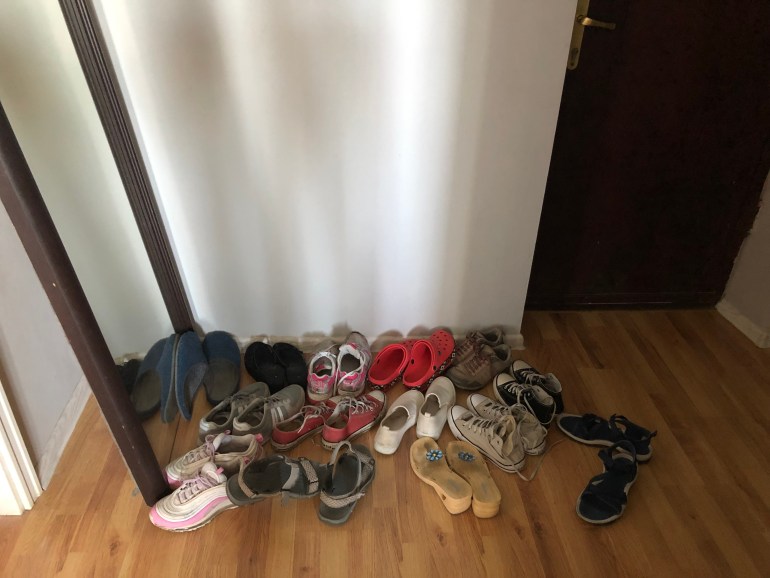
Feminist initiatives
Tanya had been living with other students from her Lviv university when the war started but realised she had nowhere to go when the dormitory shut for the summer in June, with a lot of uncertainty about whether it would reopen. Her parents’ home in the wider Lviv region was “too far for me to go and live” with them, she said. So she found a place in the city to stay for when university restarted.
Her proficiency in English meant that she was able to find plenty of volunteering opportunities with international NGOs that have flocked to Lviv since the beginning of the war, including translating for a team of American medics who were caring for injured people, and distributing humanitarian aid along the Polish border.
But she has also found volunteering opportunities through a feminist initiative started by Yana, which Ivanka is also part of.
The initiative, Bilkis, works on educational projects to raise awareness of issues surrounding women’s rights such as domestic and sexual violence and also organises humanitarian assistance for women and LGBTQ people. Through social media, including on its Instagram account, Bilkis has also documented numerous accounts of women who have been sexually harassed or assaulted in Ukraine. In recent months, Bilkis has also participated in forums to discuss the role of women in rebuilding Ukraine after the war.
Along with another member of Bilkis, Ivanka has also created a zine focused on women and LGBTQ people engaged in community activism, which is meant to serve as a tool for people hoping to get their own humanitarian projects off the ground. Meanwhile, Tanya has helped to produce educational materials for Bilkis’ projects. “If not for this apartment, I would never have heard of Bilkis, and become so close to them,” she said of her flatmates.
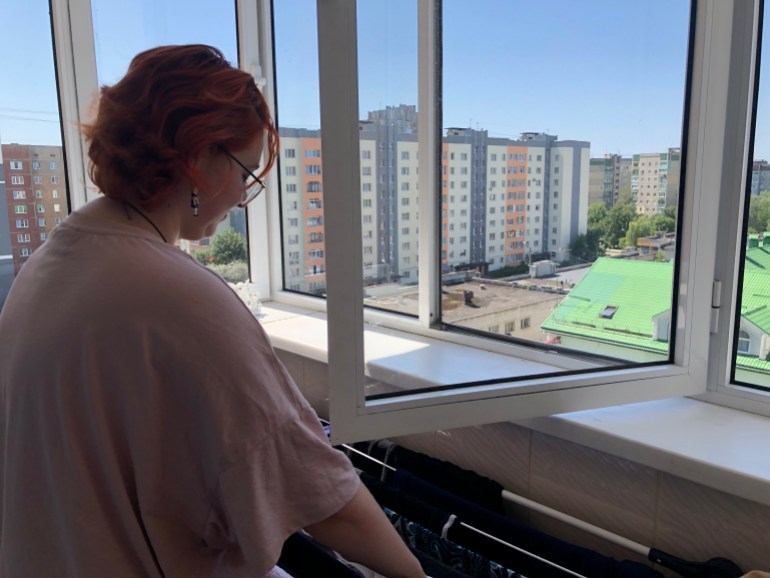
‘Not just a shelter’
Mira feels similarly inspired to learn what the other women are working on.
She lost her job at a creative agency at the beginning of the war and felt that she was starting “from zero” when she came to Lviv.
But she says she’s now happier about being in the city since moving into FemApartment. “I’m really happy that I came to Lviv because there are so many creative professionals here who just want to do something good for society,” she said, cutting into her fish. “And most importantly, I can be myself in this place – it’s not just a shelter, it’s where I can learn from other women and help people around us, together.”
In the early days of the war, living just 10km (6.2 miles) away from the town of Bucha, where at least 458 civilians were massacred in March, Mira could hear the incessant sound of gunfire from her home.
Mira, whose music is typically focused on “fighting misogyny” within hip-hop and in Ukrainian society, stopped writing lyrics.
“How could I be writing songs when rockets were killing people every day?” she asks.
In the same month, she fled to western Ukraine where she heard about a room at FemApartment. She found a job in Lviv copywriting at a company that creates a range of merchandise and NFTs featuring women leaders in Ukraine such as First Lady Olena Zelenska. Proceeds go towards rebuilding schools and universities destroyed by Russian forces. She has also started making music again.
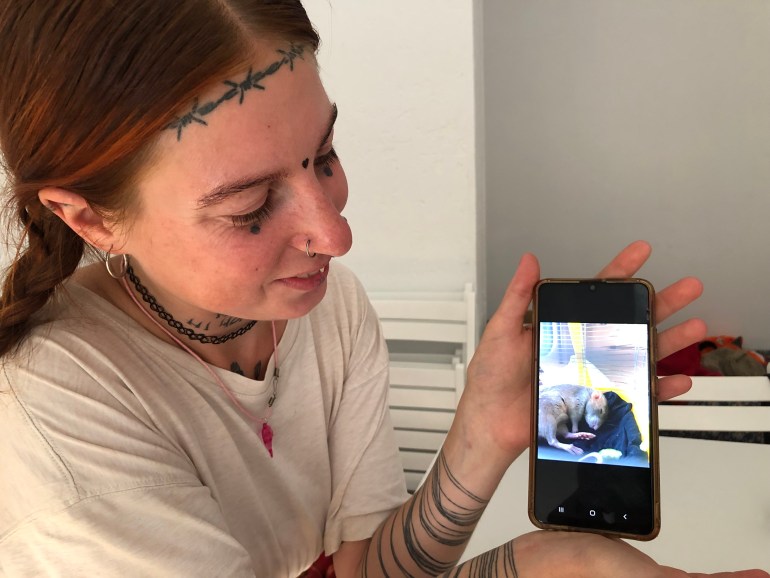
A pet rat
At 4pm that afternoon, Tanya left for her job at the second shelter opened by Feminist Workshop. She works at the shelter as one of the three managers, organising therapy and psychological support for its residents, managing any conflicts, and handling other everyday tasks such as the distribution of food and other groceries.
Her flatmate Ivanka, also a volunteer at the shelter, was there and gave Tanya a big hug when she saw her. That day it was quiet as the other managers had taken the women and children out for a day trip to alleviate their anxieties about the war.
Cutting a diminutive figure, Ivanka has long hair neatly parted into two braids, and a distinctive tattoo of barbed wire across her forehead. Her flatmates say she is the most generous of them all.
“Ivanka is always offering you an ice cream, or asking you if you want to borrow her clothes,” said Mira.
Ivanka is slightly more reticent than Mira and Tanya but quickly warms to any talk about her volunteering activities. Originally from Rubizhne, a city in the Luhansk region of eastern Ukraine, she fled her home for the first time in 2014 when the conflict first broke out there.
Over the next seven years, she settled in Kharkiv, working as a nanny and babysitter. In March 2022, she was forced to leave again when the shelling began, eventually finding her way to Lviv where she stayed in a school temporarily housing many displaced people. “I only had my pet rat with me – my best friend and only family,” she rued. “In my first month here, I was really unhappy. I couldn’t help but feel like it hadn’t been my choice to come here.”
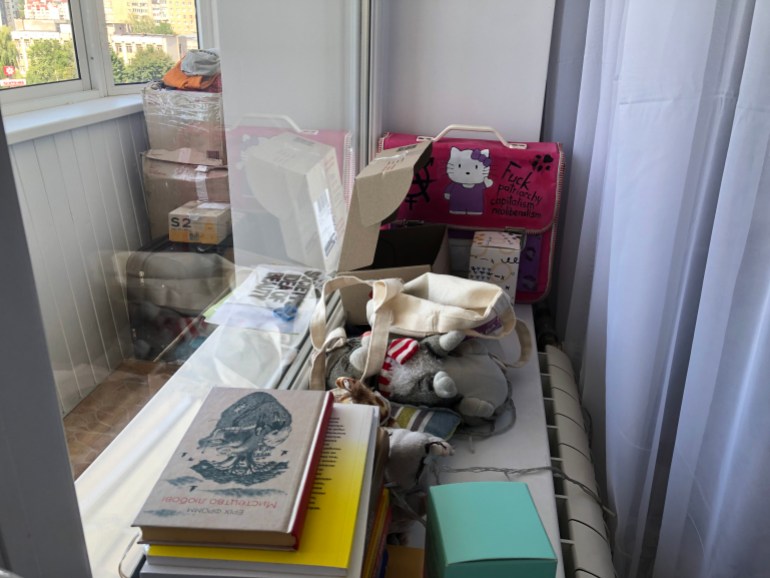
A feminist family
Even so, Ivanka began volunteering with the war effort on the very day she arrived, sorting humanitarian aid and serving food to the traumatised and dazed people arriving at Lviv railway station. Being busy assuaged some of her initial loneliness in a city where she had no friends.
Ivanka believes that her rat was equally unhappy. Her pet died suddenly one month after they arrived in Lviv, and left her feeling “alone in this world.”
But today, she feels more settled. Aside from volunteering at the shelter, she cycles around the city delivering free vegan food to members of the Territorial Defence Forces and families in need. She cares for the shelter’s nine displaced children, teaching them to read and write, taking them on walks when the weather permits, and giving them art lessons. “In the future, I would like to work more with children with antisocial behaviour,” she said.
She has found a substitute family at FemApartment and through her wider volunteering. “At first it feels like there’s nobody waiting for you, and that nobody really needs or wants you here,” she said. “But then you realise that feminism is like a big machine, it works well when every woman decides to be one small part of it.”